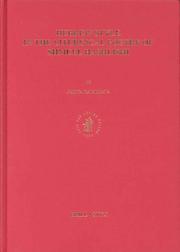| Listing 1 - 8 of 8 |
Sort by
|

ISBN: 9789004495555 9789004131514 Year: 2003 Publisher: Leiden; Boston : BRILL
Abstract | Keywords | Export | Availability | Bookmark
 Loading...
Loading...Choose an application
- Reference Manager
- EndNote
- RefWorks (Direct export to RefWorks)
Shmuel ben Hoshana, the most important Hebrew liturgical poet ( paytan ) in the final stage of the flowering of the Eretz-Israeli piyyut , came of age in the latter third of the tenth century. He was active in the academy of Eretz Israel, and reached the status of the third ("HaShlishi") in the assembly, after the gaon and the av bet din . This volume examines the Hebrew style of this paytan according to some 650 Genizah fragments, which contain elements of his wide-ranging oeuvre (orthography and phonetics, morphology, syntax, sentences, vocabulary, themes and motifs). Understanding the style of Shmuel HaShlishi is critical to our understanding of the creative activity of the paytanim of the final period of the flowering of the Eretz-Israeli piyyut. His style serves as a link between the Eretz-Israeli style of the early paytanim and the new style that would emerge in Spain.
Jewish religious poetry, Hebrew --- Piyutim --- History and criticism

ISBN: 9789004497382 9789004123908 Year: 2002 Publisher: Leiden; Boston : BRILL
Abstract | Keywords | Export | Availability | Bookmark
 Loading...
Loading...Choose an application
- Reference Manager
- EndNote
- RefWorks (Direct export to RefWorks)
A critical edition of the Hebrew liturgical poems (from the Cairo Geniza) of Nehemya b. Shelomo (Babylonia, 10th century). The English introduction includes: Hebrew neologism, unknown philosophical-scientific sources in Nehemya's poetry, possible relationships with contemporary Syriac Christianity.

ISBN: 9004123903 9004497382 Year: 2002 Publisher: Leiden Boston Styx Brill
Abstract | Keywords | Export | Availability | Bookmark
 Loading...
Loading...Choose an application
- Reference Manager
- EndNote
- RefWorks (Direct export to RefWorks)

ISBN: 9004131515 900449555X Year: 2003 Publisher: Leiden Boston Brill ; Styx
Abstract | Keywords | Export | Availability | Bookmark
 Loading...
Loading...Choose an application
- Reference Manager
- EndNote
- RefWorks (Direct export to RefWorks)
Book
ISBN: 9789004203815 9004203818 9789004203822 9004203826 1283121107 9786613121103 Year: 2011 Volume: 49 Publisher: Leiden Boston Brill
Abstract | Keywords | Export | Availability | Bookmark
 Loading...
Loading...Choose an application
- Reference Manager
- EndNote
- RefWorks (Direct export to RefWorks)
This volume contains fifteen essays in honor of Professor Joseph Yahalom who served as a lecturer at the Hebrew University from 1974 until he became full professor in 1985. The completion of his Warburg price awarded thesis in 1973 marked the start of a long and successful academic career in both Hebrew and Jewish studies, with much emphasis on poetry and poetics. Yahalom’s continuing interest in and research on ancient Piyyut led to a number of editions of Hebrew and Aramaic texts as well as to studies on the early Palestinian vocalization system and the language of Piyyut based on the Genizah findings. In 1983, Yahalom was elected a member of the Academy of the Hebrew Language. In 2003, he received the Yizhak Ben-Zvi award for his lifetime study of Jewish history and Hebrew literature. Yahalom’s research on Hebrew medieval liturgical poetry focused on a period of roughly one thousand years, from the days of early Byzantium until the final days of Jewish presence on the Iberian Peninsula and the Sephardic diaspora. His bibliography testifies to his expertise of understanding Hebrew verse, laying much emphasis on the interaction between the Jewish and surrounding cultures, which concur with Yahalom’s overall convictions and views about Jewish literature in context.
Hebrew literature --- Jewish literature --- 892.4 --- 296 "04/14" --- 296 <082> --- History and criticism. --- Hebreeuwse literatuur --- Judaïsme. Jodendom--Middeleeuwen --- Judaïsme. Jodendom--Feestbundels. Festschriften --- Festschrift - Libri Amicorum --- 892.4 Hebreeuwse literatuur --- History and criticism --- 892.4 Hebrew literature
Book
ISBN: 9783110600759 3110600757 3110594420 3110599236 Year: 2019 Publisher: Berlin: de Gruyter,
Abstract | Keywords | Export | Availability | Bookmark
 Loading...
Loading...Choose an application
- Reference Manager
- EndNote
- RefWorks (Direct export to RefWorks)
The contributions to this volume analyze how pre-modern Jewish poets related to the worlds they lived in and how their audiences related to them. It is based on a wide understanding of "world," as including not only the material world and all aspects of the man-made world, that is society, culture, and language, but also the spiritual and the emotional owrld. Studies focus on single poets or small groups of poets, on specific relations to the world, such as geographical notions, the attitude towards traditional Jewish culture or that to non-Jewish cultures, or on reception history. The collection honors Wout van Bekkum, an imortant scholar in the field of Hebrew poetry.
Digital

ISBN: 9783110599237 9783110594423 9783110600759 Year: 2019 Publisher: Berlin ;; Boston De Gruyter
Abstract | Keywords | Export | Availability | Bookmark
 Loading...
Loading...Choose an application
- Reference Manager
- EndNote
- RefWorks (Direct export to RefWorks)
Book

ISBN: 9783110599237 Year: 2019 Publisher: Berlin Boston
Abstract | Keywords | Export | Availability | Bookmark
 Loading...
Loading...Choose an application
- Reference Manager
- EndNote
- RefWorks (Direct export to RefWorks)
| Listing 1 - 8 of 8 |
Sort by
|

 Search
Search Feedback
Feedback About UniCat
About UniCat  Help
Help News
News